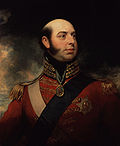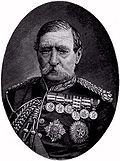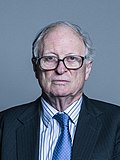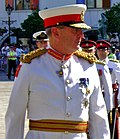Picture Term Incumbent Notes 4 August 1704 Habsburg occupation 4 August 1704 to 6 August 1704 Prince George of Hesse-Darmstadt Appointed by Archduke Charles 6 August 1704 to November 1704 Henry Nugent Appointed by Archduke Charles 24 December 1704 to 24 December 1707 John Shrimpton , Governor Appointed by Archduke Charles 24 December 1707 to 24 January 1711 Roger Elliott , Governor 24 January 1711 to 13 July 1713 Thomas Stanwix , Governor 13 July 1713 Spain cedes Gibraltar to Great Britain in the Treaty of Utrecht 13 July 1713 to 7 August 1713 Brigadier-General Thomas Stanwix, Governor 7 August 1713 to 2 January 1730 General David Colyear, 1st Earl of Portmore , Governor 20 October 1725 to 2 February 1727 Richard Kane , acting Governor 2 February 1727 to 13 May 1730 Jasper Clayton , Lieutenant Governor 15 May 1730 to 24 October 1739 General Joseph Sabine , Governor 24 October 1739 to 22 April 1740 Francis Columbine , Governor 22 April 1740 to 14 March 1748/9 William Hargrave , Governor 14 March 1748/9 to 31 May 1754 Humphrey Bland , Governor 31 May 1754 to 12 July 1756 Thomas Fowke , Governor 12 July 1756 to 16 April 1757 Lieutenant-General James O'Hara, 2nd Baron Tyrawley , Governor Later promoted to field marshal . 16 April 1757 to 28 April 1761 William Home, 8th Earl of Home , Governor 28 April 1761 to 23 June 1761 John Toovey, acting Governor 13 June 1761 to 14 June 1761[ dubious – discuss ] Major-General John Parslow , acting Governor 14 June 1761 to January 1776 Edward Cornwallis , Governor 1765 to 1767 John Irwin , acting Governor January 1776 to 25 May 1777 Robert Boyd , acting Governor 1st Term 25 May 1777 to 14 June 1787 George Augustus Eliott , Governor 14 June 1787 to July 1790 Lord Heathfield , Governor July 1790 to October 1790 Sir Robert Boyd, acting Governor October 1790 to 13 May 1794 Sir Robert Boyd, Governor 2nd Term 1794–1795 Henry Clinton , Governor Died in London before taking up the post 13 May 1794 to 30 December 1795 Charles Rainsford , Governor Robert Boyd's second-in-command and assumed position on his death 30 December 1795 to 25 February 1802 Charles O'Hara , Governor 25 February 1802 to 10 May 1802 Charles Barnett, Governor 24 May 1802 to 23 January 1820 Prince Edward, Duke of Kent and Strathearn 2 May 1803 to 17 December 1804 Sir Thomas Trigge , acting Governor For the Duke of Kent 17 December 1804 to June 1806 Henry Edward Fox , acting Governor For the Duke of Kent June 1806 to November 1806 James Drummond, acting Governor 1st Term; for the Duke of Kent November 1806 to August 1808 Sir Hew Dalrymple , acting Governor For the Duke of Kent August 1808 to May 1809 James Drummond, acting Governor 2nd Term; for the Duke of Kent May 1809 to August 1809 Sir John Cradock , acting Governor For the Duke of Kent August 1809 to October 1809 Brigadier-General John Smith , acting Governor For the Duke of Kent October 1809 to November 1809 Alex McKenzie Fraser, acting Governor For the Duke of Kent November 1809 to 2 April 1814 Colin Campbell , acting Governor For the Duke of Kent 3 April 1814 to 15 November 1821 Sir George Don , acting Governor 1st Term; for the Duke of Kent 29 January 1820 to 1835 John Pitt, 2nd Earl of Chatham , Governor 7 June 1825 to 20 June 1830 Sir George Don, acting Governor 2nd Term; for the Earl of Chatham 20 June 1830 Gibraltar becomes a British Crown colony 20 June 1830 to 10 May 1831Sir George Don, acting Governor 2nd Term; for the Earl of Chatham 10 May 1831 to 29 May 1835 Sir William Houston , acting Governor For the Earl of Chatham 28 February 1835 to 11 October 1842 Sir Alexander Woodford , Governor 11 October 1842 to 12 December 1848 Sir Robert Wilson , Governor 12 December 1848 to 26 July 1855 Sir Robert Gardiner , Governor 26 July 1855 to 5 May 1859 Sir James Fergusson , Governor 5 May 1859 to 21 September 1865 Sir William Codrington , Governor 21 September 1865 to 25 July 1870 Sir Richard Airey , Governor 25 July 1870 to 23 June 1876 Sir Fenwick Williams , Governor 23 June 1876 to 3 January 1883 Robert Napier, 1st Baron Napier of Magdala , Governor 3 January 1883 to 2 November 1886 Sir John Miller Adye , Governor 2 November 1886 to 23 August 1890 Sir Arthur Hardinge , Governor 23 August 1890 to 27 January 1891 Sir Leicester Smyth , Governor 27 January 1891 to 31 March 1891 Sir Henry Richard Legge Newdigate , acting Governor 31 March 1891 to 27 June 1893 Sir Lothian Nicholson , Governor 27 June 1893 to 7 August 1893 G.J. Smart, acting Governor 7 August 1893 to 22 May 1900 Sir Robert Biddulph , Governor 22 May 1900 to 1 August 1905 Sir George Stuart White , Governor 1 August 1905 to 30 July 1910 Sir Frederick Forestier-Walker , Governor 30 July 1910 to 11 July 1913 Sir Archibald Hunter , Governor 11 July 1913 to 9 July 1918 Sir Herbert Miles , Governor 9 July 1918 to 26 May 1923 Sir Horace Smith-Dorrien , Governor 26 May 1923 to 13 August 1928 Sir Charles Monro , Governor 13 August 1928 to 13 May 1933 Sir Alexander Godley , Governor 13 May 1933 to 12 August 1938 Sir Charles Harington , Governor 12 August 1938 to 11 July 1939 Sir Edmund Ironside , Governor 11 July 1939 to 14 May 1941 Sir Clive Gerard Liddell , Governor 14 May 1941 to 31 May 1942 John Vereker, 6th Viscount Gort , Governor 31 May 1942 to 14 February 1944 Sir Noel Mason-Macfarlane , Governor 14 February 1944 to 8 February 1947 Sir Ralph Eastwood , Governor 8 February 1947 to 23 April 1952 Sir Kenneth Anderson , Governor 23 April 1952 to 6 May 1955 Sir Gordon MacMillan , Governor 6 May 1955 to 16 April 1958 Sir Harold Redman , Governor 16 April 1958 to 8 June 1962 Sir Charles Keightley , Governor 8 June 1962 to 5 August 1965 Sir Alfred Ward , Governor 5 August 1965 to March 1969 Sir Gerald Lathbury , Governor March 1969 to 3 October 1973 Admiral of the Fleet Sir Varyl Begg , Governor 3 October 1973 to 30 May 1978 Marshal of the RAF Sir John Grandy , Governor 30 May 1978 to 1981 General Sir William Jackson , Governor 1981 Gibraltar becomes a British dependent territory Under the British Nationality Act 1981 1981 to 26 October 1982General Sir William Jackson, Governor 26 October 1982 to 19 November 1985 Admiral Sir David Williams , Governor 19 November 1985 to December 1989 Air Chief Marshal Sir Peter Terry , Governor December 1989 to April 1993 Sir Derek Reffell , Governor April 1993 to 5 December 1995 Sir John Chapple , Governor 5 December 1995 to 19 February 1997 Admiral Sir Hugo White , Governor 24 February 1997 to 21 March 2000 Sir Richard Luce , Governor 21 March 2000 to 5 April 2000 Paul Speller, acting Governor 5 April 2000 to 2002 David Durie , Governor 2002 Gibraltar becomes a British overseas territory Under the British Overseas Territories Act 2002 2002 to 16 May 2003David Durie, Governor Sir David Durie from 1 January 2003 16 May 2003 to 27 May 2003 David Blunt, acting Governor 27 May 2003 to 17 July 2006 Sir Francis Richards , Governor 17 July 2006 to 27 September 2006 Philip Barton , acting Governor 27 September 2006 to 21 October 2009 Lieutenant-General Sir Robert Fulton , Governor 21 October 2009 to 26 October 2009 Lesley Pallett, acting Governor [ 2] 26 October 2009 to 13 November 2013 Vice Admiral Sir Adrian Johns , Governor [ 3] [ 4] 13 November 2013 to 6 December 2013 Alison MacMillan , Interim Governor [ 5] 6 December 2013 to 28 September 2015 Lieutenant General Sir James Dutton , Governor [ 6] [ 7] 28 September 2015 to 19 January 2016 Alison MacMillan, Interim Governor [ 8] 19 January 2016 to 18 February 2020 Lieutenant General Ed Davis , Governor [ 9] 18 February 2020 to 11 June 2020 Nick Pyle , acting Governor [ 10] 11 June 2020 to 23 May 2024 Vice Admiral Sir David Steel , Governor [ 11] 23 May 2024 to 4 June 2024 Marc Holland , acting Governor 4 June 2024 to present Lieutenant General Sir Ben Bathurst , Governor [ 12] 
































































